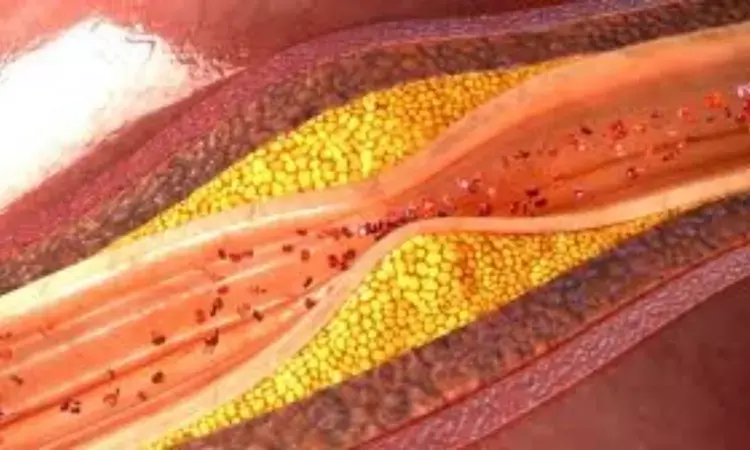- Home
- Medical news & Guidelines
- Anesthesiology
- Cardiology and CTVS
- Critical Care
- Dentistry
- Dermatology
- Diabetes and Endocrinology
- ENT
- Gastroenterology
- Medicine
- Nephrology
- Neurology
- Obstretics-Gynaecology
- Oncology
- Ophthalmology
- Orthopaedics
- Pediatrics-Neonatology
- Psychiatry
- Pulmonology
- Radiology
- Surgery
- Urology
- Laboratory Medicine
- Diet
- Nursing
- Paramedical
- Physiotherapy
- Health news
- Fact Check
- Bone Health Fact Check
- Brain Health Fact Check
- Cancer Related Fact Check
- Child Care Fact Check
- Dental and oral health fact check
- Diabetes and metabolic health fact check
- Diet and Nutrition Fact Check
- Eye and ENT Care Fact Check
- Fitness fact check
- Gut health fact check
- Heart health fact check
- Kidney health fact check
- Medical education fact check
- Men's health fact check
- Respiratory fact check
- Skin and hair care fact check
- Vaccine and Immunization fact check
- Women's health fact check
- AYUSH
- State News
- Andaman and Nicobar Islands
- Andhra Pradesh
- Arunachal Pradesh
- Assam
- Bihar
- Chandigarh
- Chattisgarh
- Dadra and Nagar Haveli
- Daman and Diu
- Delhi
- Goa
- Gujarat
- Haryana
- Himachal Pradesh
- Jammu & Kashmir
- Jharkhand
- Karnataka
- Kerala
- Ladakh
- Lakshadweep
- Madhya Pradesh
- Maharashtra
- Manipur
- Meghalaya
- Mizoram
- Nagaland
- Odisha
- Puducherry
- Punjab
- Rajasthan
- Sikkim
- Tamil Nadu
- Telangana
- Tripura
- Uttar Pradesh
- Uttrakhand
- West Bengal
- Medical Education
- Industry
No ICH risk in stroke patients with Target LDL cholesterol below 70 mg/dL: Study

France: A new analysis of the TST trial reveals that targeting an LDL cholesterol of below 70 mg/dL versus 100 mg/dL in atherosclerotic ischemic stroke patients did not significantly increase intracranial hemorrhage (ICH) risk. The recent data, published in Stroke, the journal of the American Heart Association (AHA), provides further reassurance about lowering LDL cholesterol and the risk for ICH in stroke patients.
Statins, although, are effective in the secondary prevention of ischemic stroke. Also, they are associated with an increased ICH risk in certain conditions. In the TST trial (Treat Stroke to Target), Pierre Amarenco, Department of Neurology and Stroke Center, Bichat Hospital, Paris, France, and colleagues prespecified an exploration of the predictors of incident ICH.
The study included patients with ischemic stroke in the previous 3 months or transient ischemic attack within the previous 15 days and evidence of cerebrovascular or coronary artery atherosclerosis. They were randomly assigned in a ratio of 1:1 to a target LDL (low-density lipoprotein) cholesterol of <70 mg/dL or 100±10 mg/dL, using statin or ezetimibe.
Based on the study, the researchers found the following:
· Among 2860 patients enrolled, 31 incident ICH occurred over a median follow-up of 3 years (18 and 13 in the lower and higher target group, 3.21/1000 patient-years and 2.32/1000 patient-years, respectively).
· While there were no baseline predictors of ICH, uncontrolled hypertension (HR, 2.51) and being on anticoagulant (HR, 2.36) during the trial were significant predictors.
· On-treatment low LDL cholesterol was not a predictor of ICH.
"Targeting an LDL cholesterol of <70 mg/dL versus 100±10 mg/dL in patients with atherosclerotic ischemic stroke nonsignificantly increased ICH risk," wrote the authors. "Incident ICHs were not related to low LDL cholesterol. Uncontrolled hypertension and anticoagulant therapy were associated with ICH which has important clinical implications."
Reference:
The study titled, "Intracranial Hemorrhage in the TST Trial," was published in the journal Stroke.
Dr Kamal Kant Kohli-MBBS, DTCD- a chest specialist with more than 30 years of practice and a flair for writing clinical articles, Dr Kamal Kant Kohli joined Medical Dialogues as a Chief Editor of Medical News. Besides writing articles, as an editor, he proofreads and verifies all the medical content published on Medical Dialogues including those coming from journals, studies,medical conferences,guidelines etc. Email: drkohli@medicaldialogues.in. Contact no. 011-43720751


